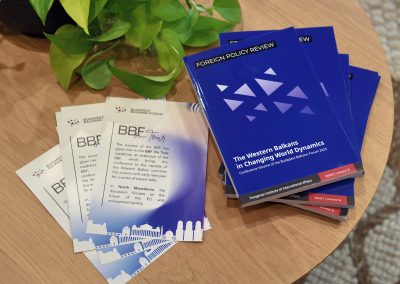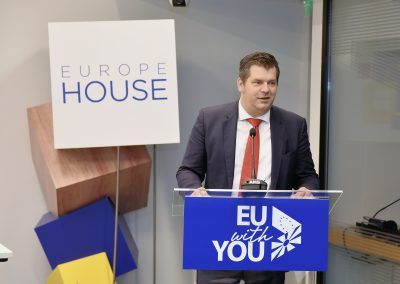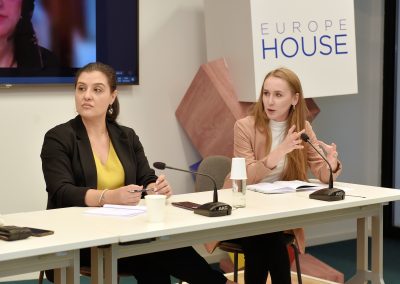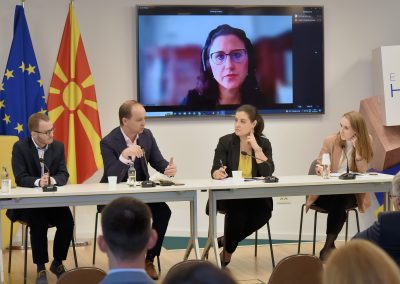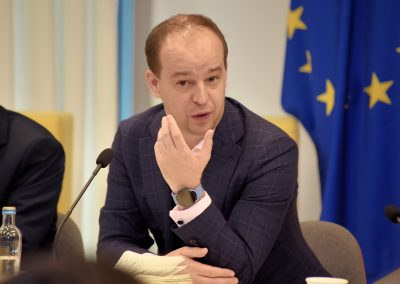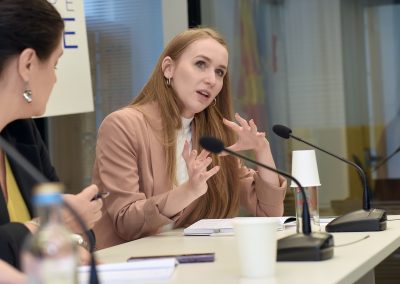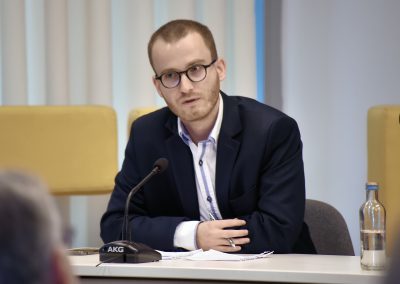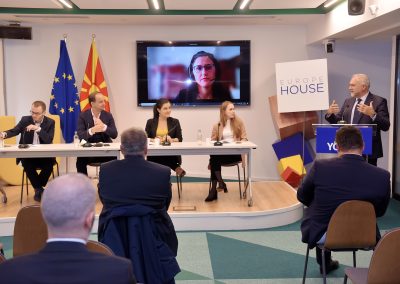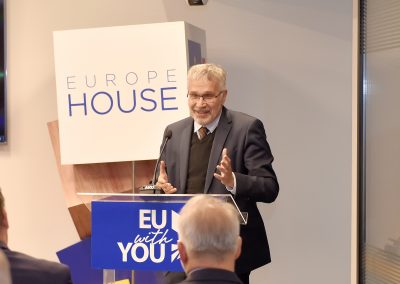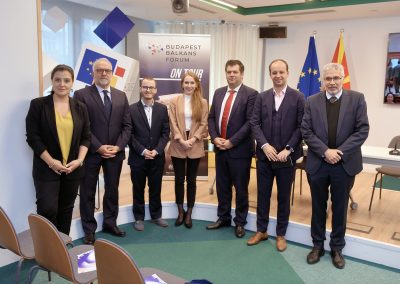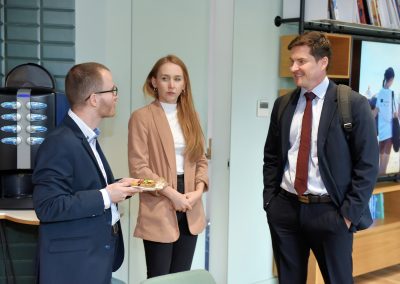The Budapest Balkans Forum on Tour (BBF On Tour) program series of the Hungarian Institute of International Affairs (HIIA) kicked off in Skopje on October 18, 2023, with an expert-level roundtable discussion, co-organised with the Embassy of Hungary in Skopje. The event, entitled “Way to the Unknown: The Future of EU enlargement policy”, featured panel speakers from North Macedonia, Germany, the Czech Republic, and Hungary. The conversation centred around the European Union (EU) enlargement policy and the EU reform as a possible precondition for enlargement.
In his opening remarks, Chief Executive Officer of HIIA Ambassador Márton Schőberl summarized the essence of the Budapest Balkans Forum and announced that next year the conference would take place on March 12-13, 2024. Talking about the BBF On Tour, Ambassador Schőberl highlighted the necessity of discussing regional issues with the inclusion of the Western Balkans so that local perspectives on EU enlargement policy could be more visible to all parties involved. András Klein, Ambassador of Hungary to North Macedonia stressed in his welcoming remarks that a strong political decision is needed to move forward with enlargement. Ambassador Klein emphasised that in a rapidly changing geopolitical world, enlargement can be the tool to guarantee stability in the Western Balkans.
The expert-level discussion opened with an introductory speech by Dragan Tilev, State Counsellor for EU Affairs and Member of the Cabinet of the Deputy Prime Minister for EU Affairs at the Secretariat for European Affairs of the Government of North Macedonia. In his keynote speech, Mr. Tilev stressed that the European Union is the best thing that happened to Europe in the last 60 years, especially owing to the EU’s ability to transform countries politically and economically. The State Counsellor described Russia’s aggression against Ukraine as a game-changer in geopolitics, thus making the Western Balkans’ integration into the EU more important than ever to strengthen and stabilize the entire continent. Mr. Tilev discussed the geopolitical turn in EU enlargement policy but voiced concerns about how to move forward with accession of new Member States. North Macedonia in this regard could potentially be a success story; a country that has compromised many times in the name of good neighbourly relations and Euro-Atlantic integration. Full-fledged membership, however, must remain the goal, emphasised Mr. Tilev and expressed optimism that the EU would be institutionally ready to welcome new Member States by 2030.
Following Mr. Tilev’s remarks, the panel discussion featured Simonida Kacarska, Director of the European Policy Institute, Margit Wunsch Gaarmann, Visiting Fellow of the German Institute for International and Security Affairs, Jan Kovář, Deputy Research Director of the Institute of International Relations Prague and Ferenc Németh, Research Fellow of HIIA. The discussion was moderated by Julianna Ármás, Research Fellow of HIIA.
Mr. Kovář first talked about the necessity of a comprehensive EU reform and mentioned that there is a historical correlation between treaty changes and enlargement; these two processes have always gone hand in hand. EU reform and enlargement are therefore linked, but it is important to underline that the two must progress simultaneously. The main challenge is that there seems to be no agreement on major issues, including the future of decision-making, possibly switching to qualified majority voting (QMV) in certain policy areas.
Following that thought, Ms. Wunsch Gaarmann highlighted that although the enlargement process is merit-based in theory, it has always been a political decision. Alas, the good aspect of this is that EU enlargement policy is the most efficient tool of the EU and can remain in the context of the Western Balkans and the Associated Trio too. Ms. Wunch Gaarman phrased the geopolitical awareness in terms of enlargement policy but noted that the so-called “Zeitenwende” in Germany has not brought any changes to Berlin’s stances on enlargement. Her conviction is that a big bang enlargement with the Western Balkans and Associated Trio would not be beneficial; rather, regrouping the countries would be the right path.
Ms. Kacarska stated that a refocus from the EU side on enlargement is evident, but the main question remains how we actually imagine enlargement. According to her, the real problem is the difference in imagining enlargement on the side of EU and on the side of the Western Balkan countries, which is why there are currently different models for enlargement. Referring to Mr. Tilev who stated that there cannot be any alternatives to full-fledged membership, Ms. Kacarska concluded that enlargement, in general, depends on the political willingness within the Member States.
Mr. Németh mentioned that the war in Ukraine brought two aspects to the forefront again: the need to reform the EU and geopolitical enlargement. He noted that debates over QMV and financial aspects, such as cohesion funds, will most certainly be at the centre of attention and thus could make it nearly impossible to undergo with treaty changes. Recognizing the need for this, and to increase the EU’s power as a global actor, is a positive step. Mr. Németh reminded the audience that next year, the EU and Member States will enter campaign mode before the European Parliamentary elections, which might hinder any processes related to EU reform and enlargement policy. Nonetheless, he remained optimistic that the geopolitical enlargement as a tool will stay on the agenda.
Regarding the necessity of having a date for enlargement, Mr. Kovář welcomed the idea, as it can push both sides to move forward with their reforms and promises. However, all parties must fulfil their obligations independently. Ms. Kacarska believes that a target date can increase the credibility of the EU and make governments more accountable. As for Ms. Wunsch Gaarman, echoing her fellow panellists, a target date can be productive but not realistic in today’s political environment. Although Mr. Németh shared the opinion of fellow panellists, he envisioned the necessity of having a clear roadmap for both candidate countries and EU institutions as well as having a long-standing political will to move forward with reforms.
For more details about the next stops of the BBF on Tour event series, visit the official website of the Budapest Balkans Forum.
For more information about the Budapest Balkans Forum, follow us on social media.

